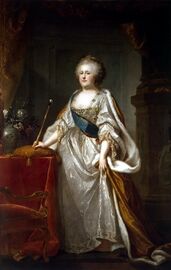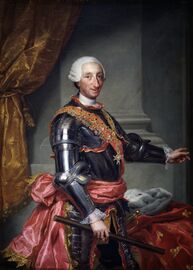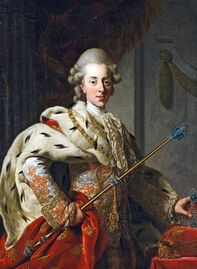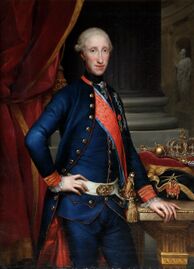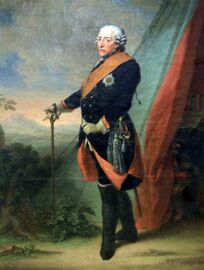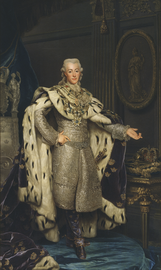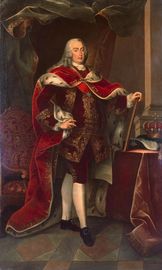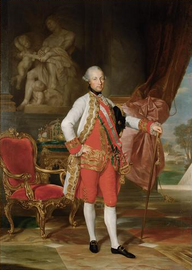الحكم المطلق المستنير
| جزء من سلسلة السياسة عن |
| الملكية |
|---|
 |
| بوابة الملكية |
الحكم المطلق المستنير (يُطلق عليه أيضاً الاستبداد المستنير) مصطلح يشير إلى سلوك وسياسات الملوك الأوروبيين المطلقين خلال القرن الثامن عشر وأوائل القرن التاسع عشر الذين تأثروا بأفكار التنوير، واعتمدوها لتعزيز سلطتهم. [1] نشأ المفهوم خلال فترة التنوير في القرن الثامن عشر وأوائل القرن التاسع عشر.
المستنير المطلق هو زعيم غير ديمقراطي أو سلطوي يمارس سلطته السياسية على أساس مبادئ التنوير.
تميز الملوك المتنورون أنفسهم عن الحكام العاديين من خلال الادعاء بأنهم يحكمون من أجل رفاهية رعاياهم. صرح جون ستيوارت ميل أن الاستبداد هو أسلوب شرعي للحكومة في التعامل مع البرابرة، بشرط أن تكون النهاية هي تحسينهم.[2]
كانت معتقدات المستبدين المستنيرين حول السلطة الملكية مماثلة عادةً لمعتقدات الطغاة العاديين، وكلاهما يعتقد أنه مقدر لهم أن يحكموا. قد يكون الحكام المستنيرون قد لعبوا دوراً في إلغاء القنانة في أوروبا.[3]
يتلخص الاستبداد المستنير للإمبراطور جوزيف الثاني إمبراطور الإمبراطورية الرومانية المقدسة على أنه "كل شيء للشعب، لا شيء من الشعب".[4]
. . . . . . . . . . . . . . . . . . . . . . . . . . . . . . . . . . . . . . . . . . . . . . . . . . . . . . . . . . . . . . . . . . . . . . . . . . . . . . . . . . . . . . . . . . . . . . . . . . . . . . . . . . . . . . . . . . . . . . . . . . . . . . . . . . . . . . . . . . . . . . . . . . . . . . . . . . . . . . . . . . . . . . . .
التاريخ
الاستبداد المستنير هو موضوع مقال بقلم فريدريش الأكبر، الذي حكم پروسيا من 1740 إلى 1786، يدافع عن نظام الحكم هذا.[5] عندما فشل الفيلسوف الفرنسي البارز في عصر التنوير ڤولتير غير محبوباً في فرنسا، قبل بشغف دعوة فريدريش للعيش في قصره. كان يعتقد أن الملكية المستنيرة هي الطريقة الحقيقية الوحيدة للمجتمع للتقدم. كان فريدريش متحمساً للأفكار الفرنسية. أوضح فريدريش: "مهنتي الأساسية هي محاربة الجهل والتحيز ... لتنوير العقول، وغرس الأخلاق، وإسعاد الناس بالقدر الذي يناسب الطبيعة البشرية، وبالقدر الذي تسمح به الوسائل المتاحة لي".[6]
رأى المستبدون المستنيرون أن السلطة الملكية لم تنبثق من الحق الإلهي ولكن من العقد الاجتماعي الذي بموجبه يُعهد إلى الطاغية بسلطة الحكم من خلال عقد اجتماعي بدلاً من أي حكومات أخرى. عزز ملوك الحكم المطلق المستنير سلطتهم من خلال تحسين حياة رعاياهم. وتحمل الملك مسؤولية رعاياه حال دون مشاركتهم السياسية.
The difference between an absolutist and an enlightened absolutist is based on a broad analysis of the degree to which they embraced the Age of Enlightenment. Historians debate the actual implementation of enlightened absolutism. They distinguish between the "enlightenment" of the ruler personally, versus that of his regime. For example, Frederick the Great was tutored in the ideas of the French Enlightenment in his youth, and maintained those ideas in his private life as an adult, but in many ways was unable or unwilling to effect enlightened reforms in practice.[7] Other rulers such as the Marquis of Pombal, prime minister of Portugal, used the ideas and practices of the Enlightenment not only to achieve reforms but also to enhance autocracy, crush opposition, suppress criticism, advance colonial economic exploitation, and consolidate personal control and profit.[بحاجة لمصدر]
The concept of enlightened absolutism was formally described by the German historian Wilhelm Roscher in 1847[8] and remains controversial among scholars.[9]
Centralized control necessitated centralized systematic information on the nation. A major renovation was the collection, use and interpretation of numerical and statistical data, ranging from trade statistics, harvest reports, death notices to population censuses. Starting in the 1760s, officials in France and Germany began increasingly to rely on quantitative data for systematic planning, especially regarding long-term economic growth. It combined the utilitarian agenda of "enlightened absolutism" with the new ideas being developed in economics. In Germany and France, the trend was especially strong in Cameralism and Physiocracy.[10]
الدول الكبرى
Government responses to the Age of Enlightenment varied widely. In several nations with powerful rulers, called "enlightened despots" by historians, leaders of the Enlightenment were welcomed at Court and helped design laws and programs to reform the system, typically to build stronger national states.[11] In France the government was hostile, and the philosophers fought against its censorship. The British government generally ignored the Enlightenment's leaders.
Frederick the Great, who ruled Prussia 1740–1786, was an enthusiast for French ideas[بحاجة لمصدر] (he ridiculed German culture and was unaware of the remarkable advances it was undergoing[بحاجة لمصدر]). Voltaire, who had been imprisoned and maltreated by the French government,[بحاجة لمصدر] was eager to accept Frederick's invitation to live at his palace.[بحاجة لمصدر] Frederick explained, "My principal occupation is to combat ignorance and prejudice ... to enlighten minds, cultivate morality, and to make people as happy as it suits human nature, and as the means at my disposal permit".[12] He wrote an essay on "Benevolent Despotism" defending this system of government.[13]
Empress يكاترينا الثانية من روسيا sponsored the Russian Enlightenment. She incorporated many ideas of Enlightenment philosophers, especially Montesquieu, in her Nakaz, which was intended to revise Russian law. However, inviting the famous French philosopher Denis Diderot to her court worked out poorly.[14]
Charles III, king of Spain from 1759 to 1788, tried to rescue his empire from decay through far-reaching reforms such as weakening the Church and its monasteries, promoting science and university research, facilitating trade and commerce, modernizing agriculture and avoiding wars. The centralization of power in Madrid angered the local nobility, and challenged the traditional autonomy of cities, and so resistance grew steadily. Consequently, Spain relapsed after his death.[15][16]
Emperor Joseph II, ruler of Austria 1780–1790, was over-enthusiastic, announcing so many reforms that had so little support that revolts broke out and his regime became a comedy of errors.[17]
In some countries the initiative came not from rulers but from senior officials such as the Marquis of Pombal, who was Joseph I of Portugal's Secretary of State.[18] For a brief period in Denmark Johann Friedrich Struensee attempted to govern in terms of Enlightenment principles. After issuing 1,069 decrees in 13 months covering many major reforms, his enemies overthrew him and he was executed and quartered.[19]
الحكام المرتبطين
- Images of enlightened absolutist monarchs
- الإمبراطور بطرس الأكبر
- يكاترينا الثانية من روسيا[20]
- كارلوس الثالث من إسپانيا[21]
- فريدريش الأكبر[22]
- Frederick VI of Denmark[23]
- Gustav III of Sweden[23]
- Joseph II, Holy Roman Emperor[21]
- Joseph I of Portugal (through his minister, the Marquis of Pombal)
- ماريا تريزا من النمسا
- ليوپولد الثاني، الامبراطور الروماني المقدس[21]
- Ferdinand IV of Naples
- Maria Carolina of Austria, Queen of Naples[24] and Sicily
- Christian VII of Denmark (through his minister Johann Friedrich Struensee)
- Philip, Duke of Parma (through his minister Guillaume du Tillot)
- Francesco III d'Este, Duke of Modena
- Ercole III d'Este, Duke of Modena
- Charles Emmanuel III of Sardinia
- Victor Amadeus III of Sardinia
- Mihailo Obrenović III of Serbia
الشرعوية الصينية
Xuezhi Guo contrasts the Confucian ideal of a "humane ruler" (renjun) with المُثُل العليا للشرعويين الصينيين, who he says "intended to create a truly 'enlightened ruler' (mingjun) who is able to effectively rule the masses and control his bureaucracy"; this ruler would be a "skilful manipulator and successful politician who uses means or 'technique' in achieving self-protection and political control." Guo quotes Benjamin I. Schwartz as describing the features of "a truly Legalist 'enlightened ruler'":[25]
He must be anything but an arbitrary despot if one means by a despot a tyrant who follows all his impulses, whims and passions. Once the systems which maintain the entire structure are in place, he must not interfere with their operation. He may use the entire system as a means to the achievement of his national and international ambitions, but to do so he must not disrupt its impersonal workings. He must at all times be able to maintain an iron wall between his private life and public role. Concubines, friends, flatterers and charismatic saints must have no influence whatsoever on the course of policy, and he must never relax his suspicions of the motives of those who surround him.[26][25]
انظر أيضاً
المصادر
- ^ Perry et al. 2015, p. 442.
- ^ Mill 1989, p. 13.
- ^ "Disappearance of Serfdom. France. England. Italy. Germany. Spain". www.1902encyclopedia.com. Retrieved 2015-12-07.
- ^ World of the Habsburgs. "Joseph II: The long-awaited son". Textmode. World of the Habsburgs. Retrieved 2015-10-21.
'Everything for the people, nothing by the people'
- ^ Reprinted in Isaac Kramnick (1995). The Portable Enlightenment Reader. Penguin Books. ISBN 978-0-14-024566-0. Retrieved 26 August 2013.
- ^ Giles MacDonogh, Frederick the Great: A Life in Deed and Letters (2001) p. 341
- ^ H. M. Scott, ed., Enlightened Absolutism: Reform and Reformers in Later Eighteenth-Century Europe, (University of Michigan Press, 1990)
- ^ A. Lentin (ed.), Enlightened Absolutism (1760-1790), Aveiro, 1985, p. ix.
- ^ Charles Ingrao, "The Problem of 'Enlightened Absolutism and the German States," Journal of Modern History Vol. 58, Supplement: Politics and Society in the Holy Roman Empire, 1500–1806 (Dec., 1986), pp. S161–S180 in JSTOR
- ^ Lars Behrisch, "Statistics and Politics in the 18th Century." Historical Social Research/Historische Sozialforschung (2016) 41#2: 238-257. online
- ^ Stephen J. Lee, Aspects of European history, 1494–1789 (1990) pp. 258–66
- ^ Giles MacDonogh, Frederick the Great: A Life in Deed and Letters (2001) p 341
- ^ Reprinted in Isaac Kramnick, ed. The Portable Enlightenment Reader (1995)
- ^ Isabel de Madariaga, "Catherine the Great" in H. M. Scott ed., Enlightened Absolutism (1990).
- ^ Nicholas Henderson, "Charles III of Spain: An Enlightened Despot," History Today, Nov 1968, Vol. 18 Issue 10, p673-682 and Issue 11, pp 760-768
- ^ Francisco Javier Guillamón Álvarez, "Institutional Reform and Municipal Government in the Spanish Empire in the Eighteenth Century." Itinerario 20.3 (1996): 109-123.
- ^ Nicholas Henderson, "Joseph II", History Today (March 1991) 41:21-27
- ^ Benjamin Otis Frick, The Enlightened Despotism of the Eighteenth Century in Portugal: The Marquis of Pombal (1902).
- ^ Henry Steele Commager, "Struensee and the Enlightenment", The search for a usable past, and other essays in historiography (1967) pp 349–623.
- ^ McKay, "A History of Western Society", Houghton Mifflin Company, 2006, pp.616–19
- Catherine the Great: Portrait of a Woman. R K. Massie, "Catherine the Great: Portrait of a Woman", Random House, 2012
- ^ أ ب ت H.M. Scott, 1990, p. 1.
- ^ H.M. Scott, 1990, pp. 265ff
- ^ أ ب H. Arnold Barton, Scandinavia in the Revolutionary Era 1760–1815, University of Minnesota Press, 1986, pp.142ff. ISBN 0-8166-1392-3.
- ^ Bearne, Catherine Mary (1907). A Sister of Marie Antoinette: The Life-Story of Maria Carolina, Queen of Naples. T. Fisher Unwin: London, p. 142.
- ^ أ ب Guo, Xuezhi (2002). The Ideal Chinese Political Leader: A Historical and Cultural Perspective. Westport, CT: Praeger Publishers. p. 141. ISBN 9780275972592.
- ^ Benjanmin I. Schwartz p. 345, The World of Thought in Ancient China
قراءات أضافية
- Behrens, Betty. "Enlightened despotism." Historical Journal 18.2 (1975): 401-408.
- Gagliardo, John G. (1967). Enlightened Despotism.
- Gershoy, Leo. (1963). From Despotism to Revolution, 1763–1789 (1944). online free to borrow
- Krieger, Leonard. An essay on the theory of enlightened despotism (U of Chicago Press, 1975).
- Ingrao, Charles. "The problem of 'enlightened absolutism' and the German States." Journal of Modern History 58 (1986): S161-S180. online
- McHugh, James T. "Last of the enlightened despots: A comparison of President Mikhail Gorbachev and Emperor Joseph II." Social Science Journal 32.1 (1995): 69-85 online.
- Mill, John Stuart (1989). J. S. Mill: 'On Liberty' and Other Writings. Cambridge University Press. ISBN 978-0-521-37917-5.
- Mueller, Christine L. (1994) "Enlightened Absolutism" Austrian History Yearbook: 1994 , Vol. 25, pp159–183. Covers the recent historiography of the role in 18th-century Austrian statecraft.
- Perry, Marvin; Chase, Myrna; Jacob, James; Jacob, Margaret; Daly, Jonathan (2015). Western Civilization: Ideas, Politics, and Society, Volume I: To 1789. Cengage Learning. ISBN 978-1-305-44548-2.
- Scott, H. M. "Whatever Happened to the Enlightened Despots?." History 68#223 (1983), pp. 245–257 online
- Scott, H. M. ed. (1990). Enlightened Absolutism: Reform and Reformers in Later Eighteenth-Century Europe.
- Szabo, Franz. Kaunitz and Enlightened Absolutism 1753-1780 (1994) online as ACLS Humanities E-Book
وصلات خارحية
- Biography.com Editors. "Joseph II Biography". A&E Television Networks. Retrieved 2015-10-21.
{{cite web}}:|author=has generic name (help) - World of the Habsburgs. "Joseph II: The long-awaited son". Textmode. World of the Habsburgs. Retrieved 2015-10-21.
'Everything for the people, nothing by the people'
- "Enlightened despotism". Britannica.
